2016 Toyota 4Runner Repair, Service & Tires
Get Started
Complete Auto Care for Your 2016 Toyota 4Runner
-
TIRES FOR YOUR 2016 Toyota 4Runner View Tire Info GET TIRE PRICING
-
REPAIR FOR YOUR 2016 Toyota 4Runner View Repair Info SCHEDULE REPAIR
-
MAINTENANCE FOR YOUR 2016 Toyota 4Runner View Maintenance Info SCHEDULE MAINTENANCE
-
OFFERS FOR YOUR 2016 Toyota 4Runner Limited Time Tire Offers VIEW ALL COUPONS
2016 Toyota 4Runner Tires
Recommended Tires | Tire Information
2016 Toyota 4Runner Tires Sizes, Speed Ratings, and Inflation
Not sure about your 2016 Toyota 4Runner tire size? Use the following chart to find information on tire size, speed rating, and inflation.
| Trim Level | Speed Rating | Inflation in PSI F/R | Tire Size |
|---|---|---|---|
| 2016 Toyota 4Runner Trail | S | 32 PSI/32 PSI | P265/70R17 |
| 2016 Toyota 4Runner Limited | H | 32 PSI/32 PSI | P245/60R20 |
| 2016 Toyota 4Runner TRD Pro | S | 32 PSI/32 PSI | P265/70R17 |
| 2016 Toyota 4Runner SR5 | S | 32 PSI/32 PSI | P265/70R17 |
|
2016 Toyota 4Runner Trail Speed Rating: S Inflation F/R: 32 PSI/32 PSI |
|
2016 Toyota 4Runner Limited Speed Rating: H Inflation F/R: 32 PSI/32 PSI |
|
2016 Toyota 4Runner TRD Pro Speed Rating: S Inflation F/R: 32 PSI/32 PSI |
|
2016 Toyota 4Runner SR5 Speed Rating: S Inflation F/R: 32 PSI/32 PSI |
* Note: these models have different tire sizes depending on vehicle options.
Recommended Tires for Your 2016 Toyota 4Runner
What tires are best for a 2016 Toyota 4Runner? Check out the following tire brands and types.
 ALENZA AS ULTRA
ALENZA AS ULTRA
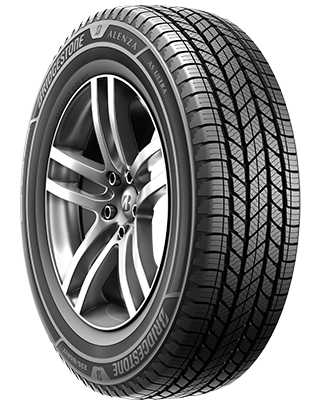
- No warranty
- All-Season
- Light Truck Tires
 Blizzak DM-V2
Blizzak DM-V2
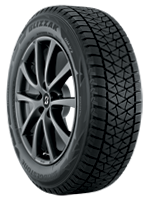
- No warranty
- Winter
- Winter
 Dueler H/T 684 II
Dueler H/T 684 II
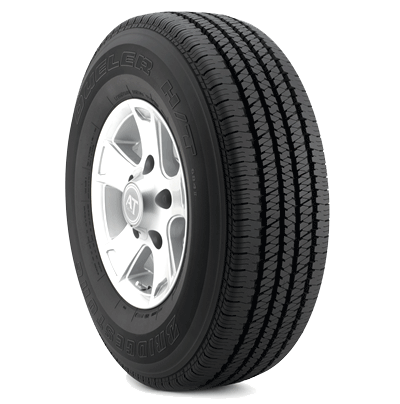
- Platinum Pact Limited Warranty
- All-Season
- Light Truck Tires
 Dueler A/T Revo 3
Dueler A/T Revo 3
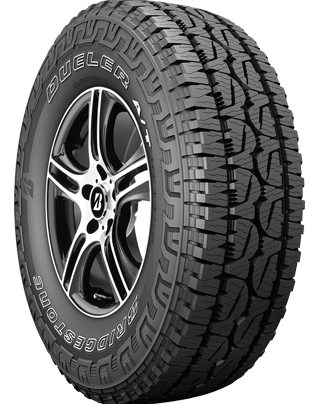
- Platinum Pact Limited Warranty
- All-Season
- Light Truck Tires
 Dueler A/T Revo 3 - LT
Dueler A/T Revo 3 - LT
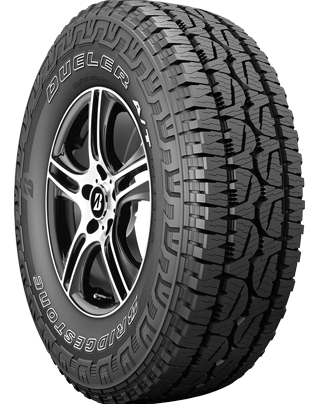
- Platinum Pact Limited Warranty
- All-Season
- Light Truck Tires
 Dueler A/T RH-S
Dueler A/T RH-S
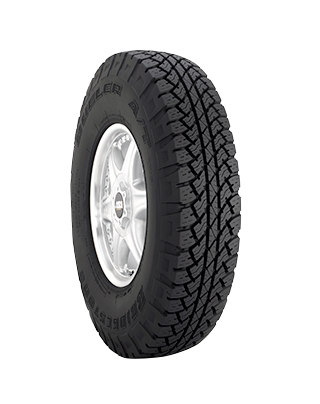
- Platinum Pact Limited Warranty
- All-Season
- Light Truck Tires
 Destination A/T2
Destination A/T2
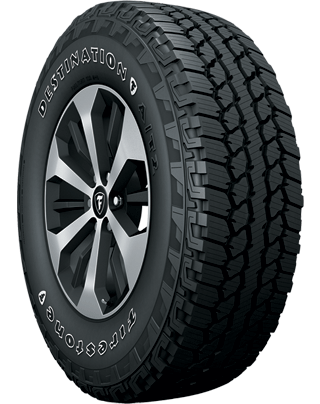
- Gold Pledge Limited Warranty
- All-Season
- Light Truck Tires
 Destination LE3
Destination LE3
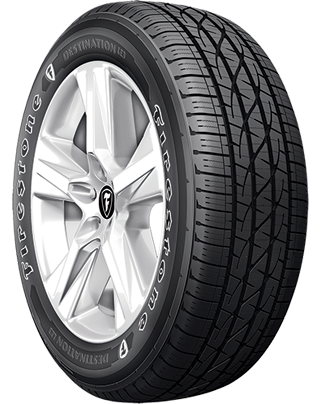
- No warranty
- All-Season
- Light Truck Tires
 Destination X/T
Destination X/T
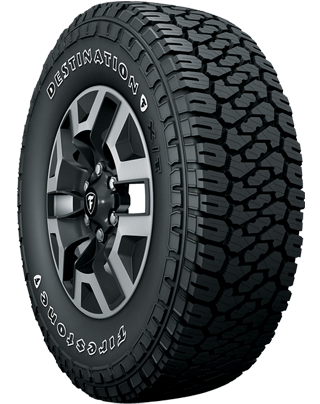
- Gold Pledge Limited Warranty
- All-Season
- Light Truck Tires
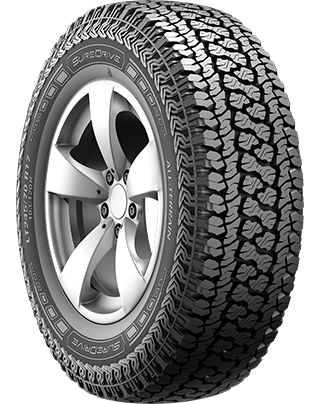
- No warranty
- All-Season
- Light Truck Tires
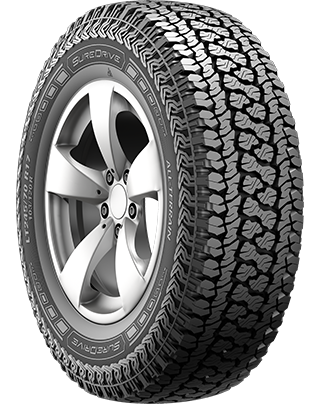
- No warranty
- All-Season
- Light Truck Tires
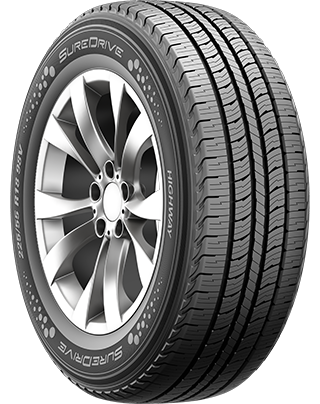
- No warranty
- All-Season
- Light Truck Tires
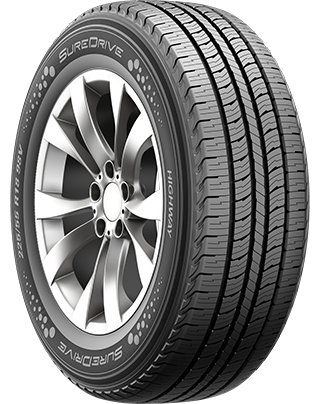
- No warranty
- All-Season
- Light Truck Tires
 OPEN COUNTRY A/T III
OPEN COUNTRY A/T III
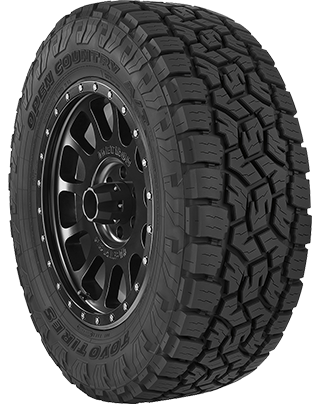
- No warranty
- All-Season
- Light Truck Tires
Choosing 2016 Toyota 4Runner Tires
Beyond the correct tire size, you also want to consider a handful of other factors when buying new Toyota 4Runner tires like how and where you drive, and how much you want to spend. When evaluating your driving conditions, think about where you live (countryside vs. city vs. mountains) and the kind of unexpected weather you're likely to experience. It's not uncommon for drivers in states that experience all four seasons to buy more than one set of tires. one for winter and one for summer. Other drivers prefer to purchase one all-season set to limit trips to the tire shop and make sure their vehicle is prepared in the rain, sleet, snow, or sun!
Your personal driving style is the next factor to consider. If you're a big off-roading fan who forges paths where others can't, you have very different needs than a long-distance commuter who sticks to the highway. Browse Toyota 4Runner tires online or come to your nearby Firestone Complete Auto Care for help selecting the tire that's right for you.
Installing Toyota 4Runner Tires
Firestone Complete Auto Care has been a leading tire provider for more than a century. We're your one-stop shop for tire installation, rotation, and ongoing maintenance! Buy 2016 Toyota 4Runner tires online and schedule your installation when it's convenient for you.
Questions About 2016 Toyota 4Runner Tires
-
Why does Toyota tire inflation matter? A small decrease in tire pressure can have a big impact on your driving. Maintaining proper tire pressure can help improve braking time, increase fuel economy, and boost tire lifespan.
-
Why are there numbers on the side of my Toyota 4Runner tires? The numbers on your tire sidewall give you information about tire speed rating, traction, treadwear, tire size, and load carrying capacity. Chat with a tire technician to learn how to read the numbers on your Toyota tires!
-
How do I check the tread depth on my Toyota tires? Stay on top of your tire tread depth to help avoid a dangerous drive. You can check tread depth with a penny. Hold the penny so that Abraham Lincoln is facing you, then place your penny into a tread groove upside down. If you can see the top of Abe’s head, your tread is shallow and it might be time for new Toyota 4Runner tires. Grab a penny. Hold the so that Abe Lincon's head is facing you and his hair is pointing toward the ground. Then, place the penny into a tread groove. If you can see the top of Abe’s head, your tread is shallow and it might be time for new Toyota 4Runner tires.
Repair Services for Your 2016 Toyota 4Runner
Want more details? Choose a service below to read more about Toyota 4Runner repairs at Firestone Complete Auto Care.
Get Repairs for Your 2016 Toyota 4Runner
No driver looks forward to car repairs. We’re here to change that, though. At Firestone Complete Auto Care, we want to make car repair painless and hassle-free. Bring your 2016 Toyota 4Runner in for repair services and rest easy knowing that your 4Runner is in capable hands. We’ll start by assessing what repairs may be needed, and we’ll provide you with a detailed explanation of what we recommend. If a repair isn't necessary, we won't recommend it.
What Will Toyota 4Runner Repairs Cost?
Several factors can affect the cost to repair your 2016 Toyota 4Runner, including the type of repair, the cost of any replacement parts, how much labor the repair will take, and the state you live in. And check back often — we update our deals regularly!
A few different aspects can influence repair costs for your 2016 Toyota 4Runner, like
2016 Toyota 4Runner Auto Repair Q&A
-
Can scheduled maintenance help me avoid repairs? The cheapest 2016 Toyota 4Runner repair is the one that isn’t necessary in the first place! Staying up-to-date with your car’s scheduled maintenance services is a great way to keep future repair costs low.
-
What does it mean to be 'in tune' with your car? No, we’re not talking about finding the best jams on the radio! You know your car best, and you’re the first person who will notice if something doesn’t feel right (like new smells, sights, or sounds coming from your car). If you sense that something is 'off,' stop in for a Courtesy Check to have these symptoms checked out ASAP. Early action could help you prevent Toyota 4Runner repairs.
-
Are the repairs you recommend for my Toyota actually needed? Talk to your technician. We'll never recommend a service or repair for your 2016 Toyota 4Runner that we don't think is necessary for your safety.
2016 Toyota 4Runner Brake Repair
Your Toyota 4Runner engine may be strong and reliable. But if you can’t brake, it might as well be scrap metal. Don't wait if you're experiencing brake squeaks or a loss of braking power. Unresponsive brakes make it tough to give the road your best. Plus, ignoring your brake problems can result in more damage and higher brake repair bills. Go to your local Firestone Complete Auto Care for 2016 Toyota 4Runner brake repairs. Our brake repair services include brake pad/shoe removal and replacement, rotor/drum resurfacing, brake fluid exchange, and wheel cylinder and brake caliper installation.
Answers to Your 4Runner Brakes Questions
-
Why does my 4Runner shake when I brake? If your 4Runner shakes when you brake, you could be dealing with warped rotors, faulty brake calipers, worn brake pads or rotors, or loose or worn suspension parts. Schedule a free brake inspection at Firestone Complete Auto Care for help diagnosing your brake issue.
-
How long can I expect my 4Runner brake pads to last? Brake pads generally last between 30,000 and 40,000 miles. Your driving can affect how long your 4Runner brake pads last, though. For example, mainly driving on highways and gradually braking can help increase the lifespan of your brake pads, and carrying hefty loads or riding your brakes can shorten it.
-
Is it bad if my 4Runner is leaking brake fluid when off? Your 4Runner brake system is a closed hydraulic system, so a brake fluid leak likely means you have an issue in your brake system. Over time, brake components can wear out or get damaged, causing a brake fluid leak.
2016 Toyota 4Runner Drivetrain Repairs
Drivetrains for front, rear, and all-wheel-drive and 4WD vehicles are not all the same. You don't want to go to any random shop for drivetrain repair. You want to come see the technicians at Firestone Complete Auto Care. We can fix many 2016 Toyota 4Runner drivetrain components Your 4Runner might need driveshaft repair if you notice heavy vibrations in your floorboards, clunks when shifting, resistance when turning, or vibration as your vehicle accelerates.
2016 Toyota 4Runner Drivetrain Questions
-
What are signs my Toyota drivetrain is damaged? Hear noises toward the back of your Toyota 4Runner? See fluid leaking? Having issues turning? These could all be signs of drivetrain damage you don't want to ignore. Take action quickly to catch repairs or replacements before something more severe happens.
-
What triggers the malfunction indicator light (MIL) in a 4Runner? If your 4Runner has its malfunction warning light (more commonly called the check engine light) illuminated, it could indicate engine troubles, problems with the transmission, electrical issues, malfunctioning sensors, connector problems, or misfire issues.
-
Is a drivetrain malfunction in my 4Runner serious? If your 4Runner has a drivetrain malfunction, don't wait. Get it checked out by a professional mechanic. Identifying the underlying cause and performing the appropriate repairs right away can help prevent further damage and avoid unsafe driving conditions.
2016 Toyota 4Runner Alignment Services
Alignment services involve precise adjustments to your Toyota 4Runner’s suspension system, the connection between the vehicle and the wheels. In an alignment service, your tire angles are adjusted according to measurements recommended by Toyota. Why? So that your tires can make contact with the road at the best possible angle. Bring your 2016 Toyota 4Runner in for a wheel alignment and we'll start with an alignment check. After that, we can adjust your wheel alignment angles until they match Toyota’s recommended measurements.
Answers to Toyota 4Runner Alignment Questions
-
What can knock my Toyota 4Runner out of alignment? Potholes and uneven roads can knock your car out of alignment, so stay aware of the road ahead and adjust your speed (or avoid these obstacles whenever it’s safely possible).
-
How frequently should you get a wheel alignment for your 4Runner? It’s usually suggested you check your alignment about every 6,000 miles or 6 months (whichever occurs first). Still, you should reference your 4Runner owner’s manual for Toyota's recommended interval.
-
Do you need to get your 4Runner wheels aligned? It’s likely not a requirement to get an alignment when you install new tires on your 4Runner, but it's a smart idea to do so anyway. An alignment can help ensure even tire wear, smooth handling, and better fuel efficiency.
2016 Toyota 4Runner Engine Services
If your 2016 4Runner engine needs repairs, our technicians will make sure you understand what’s going on before they start working on your engine. We make recommendations, but you make the final decision. If a repair can wait, we'll let you know. If it's necessary for your safety, we'll make sure you understand that, too. We want to provide you with the information you need to make an informed engine repair decision. Turn to Firestone Complete Auto Care for your 2016 4Runner engine repairs and you can feel good knowing that we only use Toyota-compliant replacement parts such as the serpentine belt, motor oil seal, ignition coil, or a different component.
Questions About 2016 Toyota 4Runner Engines
-
Why does the check engine light come on when I start my 4Runner? Generally, your check engine light turning on upon ignition is not a bad thing. It’s just your 4Runner firing up its circuits. The light should turn off in a bit, but come see us if it doesn't.
-
Are Toyota 4Runner engine noises bad? Strange engine sounds can be a sign something’s off in your Toyota 4Runner. Knocking or tapping could be a symptom of low oil. A high-pitched whistle could signal an intake leak or misaligned belt. Squealing can be traced back to a loose fan belt, and grinding might be a sign of brake problems rather than engine issues.
-
What could damage my Toyota 4Runner engine? Certain driving habits can hurt your engine. These habits include driving on an empty fuel tank, revving your engine while the vehicle is in Park, or slamming the gas pedal while the engine is still cold. Steer clear of these habits to help protect engine performance and efficiency.
2016 Toyota 4Runner Tire Repair
Firestone Complete Auto Care is here for you when your 2016 Toyota 4Runner needs flat tire repair or inspection. In some cases, a tire doesn’t have to be replaced – it can be plugged and patched with a simple repair. Depending on the damage, though, a repair might not be the right move. Our technicians can determine which option is best for your situation. We’ll begin by taking a look at where the damage is, the type and extent of the tire damage, and how all of your tires are wearing.
If we determine that your 2016 Toyota 4Runner tire can be safely repaired, the repair process is actually fairly simple: (1) Remove the tire from the wheel for inspection and repair, (2) fill in the area that’s been punctured to prevent damage from moisture, and (3) seal the inner liner with a repair unit to prevent air loss.
Your Questions About Toyota 4Runner Tire Repair, Answered
-
Can I drive my Toyota on a flat tire? Driving on a flat or underinflated tire can put extra stress on your wheels and alignment. While it’s sometimes necessary to drive a short distance on a flat tire to get to a safe place, don’t take any other trips in your 4Runner until you can have the flat tire repaired or replaced.
-
Will a temporary sealant fix my Toyota's flat tire? Temporary sealants will solve your problem… for a little bit. If you’ve seen temporary or emergency tire sealant before (it usually comes in a can), it can be tempting to turn to this as a solution for your flat tire. Keep in mind that these fixes could buy you some time to get to Firestone Complete Auto Care for a proper repair, but they could also cause some harm in the process (for example, damage to your TPMS). Plus, using a product like this could void your tire warranty.
-
Why do the tires on my 4Runner keep losing air? Tire punctures, damaged wheels, and leaking valve stems are possible reasons for your 4Runner tires continuously losing air.
Maintenance for Your 2016 Toyota 4Runner
When it comes to your Toyota 4Runner, how you treat your car makes all the difference in its performance. With proactive maintenance, your 4Runner could be on the road well past the 200,000 mile mark.
2016 Toyota 4Runner Maintenance Schedule
What is the manufacturer recommended maintenance schedule for a 2016 Toyota 4Runner? Find maintenance info for your vehicle.
Guide to 2016 Toyota 4Runner Scheduled Maintenance
Instead of waiting for an issue to arise with your 4Runner, you can stay ahead of problems before they even begin. It’s as easy as following the recommended maintenance schedule that’s been written specifically for your 2016 Toyota 4Runner! Toyota knows your vehicle inside and out (they made it, after all!), so they’ve designed this schedule with your car’s unique needs in mind. Scheduled maintenance services can vary depending on driving conditions, climate, and other factors; however, there’s a good chance that your vehicle’s recommended maintenance services will include tire rotations, vital fluid checks/exchanges, filter changes, brake pad replacement, and oil changes. Staying on track with routine service appointments can help your 4Runner perform better, decrease your risk of dangerous malfunctions on the road, and prevent common 2016 Toyota 4Runner problems.
Essential Maintenance to Keep Your 2016 Toyota 4Runner Running Newer, Longer
Come to Firestone Complete Auto Care for manufacturer-recommended routine maintenance on your 2016 Toyota 4Runner and an expert technician will begin by performing a Courtesy Check. The Courtesy Check helps us see what we’re working with under the hood, and allows us to alert you to any potential problems before they worsen. Each Courtesy Check includes a free battery test and an inspection of your 4Runner's windshield wiper blades, head and tail lights, filters, fluid levels, tires, and alignment.
Firestone Complete Auto Care is your spot for 2016 Toyota 4Runner maintenance. We can help you keep your vehicle (and your life!) running smoothly. Many of our locations have weekend and evening hours for your convenience.
Questions About 2016 Toyota 4Runner Maintenance
-
When should I have Toyota 4Runner alignment checked? You know your Toyota 4Runner better than anyone else, so you’ll know if something doesn’t feel right while driving. Have your alignment checked (and adjusted if necessary) as soon as you notice a pulling steering wheel to prevent suspension damage or uneven tire wear.
-
When should I switch my Toyota 4Runner to high mileage oil? If your Toyota 4Runner has ticked past 75,000 miles, consider switching to high mileage oil at your next oil change to give your engine what it needs to go another 75,000 (or more!). High mileage oil: make it a high priority!
-
Can I ignore dashboard lights on my Toyota? Don't ignore dashboard warning lights! Bring your Toyota 4Runner in for a diagnostic code scan as soon as a dashboard warning light flashes on, whether it's your check engine or battery light. Dashboard lights alert you to trouble under the hood.
The Right Battery Size for a 2016 Toyota 4Runner
Not sure what battery to get for your Toyota 4Runner?
| Battery | Engine | Warranty | Cold Cranking Amps | |
|---|---|---|---|---|
| 24F-3 | V6/4.0L | Replacement 24 months | Performance months | 650 |
| 35-2 | V6/4.0L | Replacement 36 months | Performance months | 640 |
| 24F-RP | V6/4.0L | Replacement 48 months | Performance months | 750 |
2016 Toyota 4Runner Car Batteries
On average, auto batteries last anywhere from three to five years. You want to replace your 2016 Toyota 4Runner battery before it fails and leaves you stranded. Watch for signs that your current battery is getting too old or too weak. A lagging starter, a blinking battery or check engine light, swollen battery case, corrosion-covered posts, or weak lights can all be signs that your battery is waving goodbye.
You can also get a Free Battery Test at your local Firestone Complete Auto Care. Visit us for a complimentary battery check and, if needed, get your Toyota 4Runner a replacement battery. Automotive batteries are just one of our many areas of expertise. Our technicians are well-acquainted with Toyota’s service specs for 4Runner battery cold cranking amps and reserve capacity. Get help choosing the battery size that matches your vehicle, and schedule an appointment today for a quick car battery replacement.
Answers to Your Toyota 4Runner Car Battery Questions
-
Why won’t my Toyota 4Runner battery hold a charge? A car battery that needs to be jump-started every time is as good as dead. It may be getting old. Or, you’ve been leaving the doors slightly open and the dome lights on during the night. Stop in for a free battery check at your nearest Firestone Complete Auto Care and learn more about your battery's charge.
-
How long do car batteries last? The typical 12-volt car battery may last three to five years, depending on the type of battery, the driving conditions, and how well the battery is maintained.
-
Why is there white, flaky stuff around my 4Runner’s battery post? The white, crusty stuff that can accumulate around 4Runner car battery terminals is called corrosion. It is caused by a chemical reaction between the battery acid and the air, which creates a white, powdery substance that can build up on the terminals over time. Corrosion can interfere with the flow of electricity between the battery post and the car's electrical system, sometimes leading to poor electrical performance, difficulty starting, and even premature battery failure.
Oil Changes for 2016 Toyota 4Runner
Toyota recommends changing your 2016 4Runner’s oil at regular intervals. Outside of Toyota-recommended oil change intervals, your 4Runner may need an oil change if your check engine light is on, you hear knocking sounds coming from the engine, smell oil inside the vehicle, or notice excess vehicle exhaust. You might need an oil change more frequently than what’s recommended by Toyota if you regularly haul heavy loads, frequent dusty roads, go off-roading a lot, or go at low speeds on long distance trips.
Your local Firestone Complete Auto Care has the right 2016 Toyota 4Runner motor oil: either synthetic or conventional. Consult Toyota's recommendations to select the right 2016 4Runner oil and talk with a teammate to learn more about our oil options: Quaker State® Advanced Durability™ conventional oil, Pennzoil® High Mileage Vehicle® motor oil, Pennzoil Platinum® Full Synthetic motor oil with PurePlus™ Technology, and Shell Rotella® heavy-duty engine oil. In an oil change service, an auto technician will change your 4Runner’s oil, replace and recycle your used oil and oil filter, check all of your other filters, refill vital car fluids, and visually inspect the rest of the vehicle. Let the experts take care of your 4Runner’s engine by making an oil change appointment today.
2016 Toyota 4Runner Oil Change Q&A
-
What can cause the oil light on my Toyota 4Runner to illuminate? The oil change light in your Toyota 4Runner could be triggered by an overdue oil change. However, if the oil pressure light is on, you may be dealing with low engine oil, a failing oil pump, a clogged oil filter, or a malfunctioning oil pressure sensor.
-
How hard is it to change Toyota 4Runner oil at home? Changing engine oil at home isn’t as simple as it’s made out to be. You’ll have to figure out how to properly dispose of the oil and buy special tools. Having your oil changed professionally can not only reduce the risk of something going wrong during the service, but it’ll also help your car perform smoothly down the road.
-
Why is my Toyota exhaust smoke gray or blue? There could be an oil leak and your engine is burning oil. Time to have a qualified technician check things out. The leak could be caused by several issues like leaking valve seals, damaged piston rings, or worn cylinder walls.
2016 Toyota 4Runner Tune-Up & Engine Service
Periodic tune-ups can bring more power back to your 4Runner’s engine. The Firestone Complete Auto Care location in your community offers several Toyota 4Runner engine tune-up services. The first is the standard Firestone Tune-Up. It includes a complete visual inspection of engine components, installation of new spark plugs, and a lifetime warranty on parts*. Another service option pays special attention to the filters in your 4Runner. Specifically, we replace the fuel filter and air filter. Our third service is a thorough cleaning of the fuel system. During this type of tune-up, we use a three-step process to get rid of harmful varnish, dirt, and carbon deposit buildup in your 4Runner’s fuel injectors, throttle body, and throttle plate. The result? Restored fuel system performance. Consider this when choosing a tune-up service for your 4Runner: your vehicle’s maintenance record and mileage can determine which service is best. Ask one of our technicians what your vehicle needs, based on your driving habits and your car’s current condition.
*Ask a Firestone Complete Auto Care teammate about full terms and conditions for warranties.
Questions About 2016 Toyota 4Runner Engine Tune-Ups
-
When should Toyota 4Runner spark plugs be replaced? Replace spark plugs on time or about every 30,000 miles or so. Spark plugs are small but mighty. The spark of electricity that the plug emits across a small gap creates the ignition for the combustion needed to start your car. Without that spark, your car won't start.
-
What do I do if I see a pool of liquid under my Toyota 4Runner? Don't ignore puddles of fluid under your Toyota 4Runner. It could signal a coolant leak, brake fluid leak, or an oil leak. Let any one of these leaks linger and it could cause engine damage.
-
How often should I clean my Toyota 4Runner fuel injectors? Factors like fuel type and driving conditions can affect how frequently you need to clean your 4Runner fuel injectors. Some manufacturers recommend a fuel system cleaning as part of routine maintenance, or as needed if your vehicle is showing signs of poor fuel system performance.
Suspension Service & Repair for 2016 Toyota 4Runner
During the first few years you had your 2016 Toyota 4Runner, the ride was probably so smooth that you didn’t even think about it! But these days, things are starting to feel a bit rough. Maybe your 4Runner jolts, sways to one side, or makes noise whenever you turn or drive over a speed bump. As soon as you notice that something’s “off” with your 2016 Toyota 4Runner, bring it in for suspension and steering service. We’ll get to the root of the issue and, if your car needs steering and suspension repairs, we'll explain all of your options and the potential cost.
2016 4Runner Steering & Suspension Q&A
-
Why is my Toyota 4Runner bouncing excessively? Excessive bouncing in your Toyota 4Runner might be due to damaged struts or shocks that are unable to absorb road bumps effectively, causing your vehicle to feel more like a pogo stick than a smooth ride.
-
What can cause the front end of my 4Runner to dip forward when I apply the brakes? The forward momentum and weight transfer to the front wheels during braking can cause your 4Runner's front end to dip forward. A damaged or faulty suspension system may fail to distribute the weight and force effectively, causing the front end to dip even more.
-
Does treadwear and tire pressure impact my 4Runner's steering and suspension? Maintaining your tires can help reduce strain on the suspension, nd also let you know when it's time to replace your tires. A faltering steering and suspension system could lead to uneven tire wear.
2016 Toyota 4Runner A/C Service Near You
Our trained technicians will do what they can to solve your 2016 Toyota 4Runner A/C problems. During this initial A/C performance check, we’ll look at the state of your 2016 Toyota 4Runner’s A/C system to see if repair work is required. This check includes a visual inspection, performance test, and pressure and leak test.
While your 2016 Toyota 4Runner’s air conditioner is being serviced, we’ll also do an A/C evacuation and recharge. During this process, a technician will remove the old refrigerant from the A/C system. Next, they will evacuate the system according to Toyota's recommendations. To finish, we’ll add new refrigerant to recharge the A/C system.
2016 Toyota 4Runner A/C System FAQs
-
Why do I get hot air from my 4Runner A/C? An A/C blowing hot air has several possible root causes. There could be an issue with your compressor clutch, a blown fuse, a leak, or a clog in the expansion valve.
-
How does my A/C system get a leak? A/C system leaks are often due to a combination of age and moisture. Rubber seals and gaskets naturally degrade over time, allowing refrigerant to exit and moisture to enter your 4Runner's A/C system.
-
What is causing my 4Runner’s A/C to only work when the car is in motion? If your A/C only works when the vehicle is moving, there could be a problem with part of your 4Runner’s A/C or electrical system. Potential issues include low coolant or a faulty cooling fan.
2016 Toyota 4Runner Transmission Service & Repairs
The transmission delivers power from the motor to your wheels so that you can drive at your desired speed. Because of the transmission’s responsibility to translate the right dose of power into the right amount of speed, a tiny transmission issue can take a major toll on your car’s performance. 2016 Toyota 4Runner transmission issues could include shifting delays, jumping or grinding during acceleration, a feeling of shakiness, or whistling noises or a burning smell coming from beneath the hood. If you ignore Toyota 4Runner transmission issues you might notice your fuel economy decrease or discover that your 4Runner’s not even driveable. Our expert techs are familiar with 2016 4Runner services and perform them according to Toyota-recommended specifications. Schedule an appointment at your local Firestone Complete Auto Care at the first sign of transmission problems to help keep your Toyota running for miles and miles.
2016 Toyota 4Runner Transmission Q&A
-
How often does my 4Runner transmission fluid need to be checked? Caring for your Toyota 4Runner’s transmission fluid is a great way to help it perform. About every 30,000 to 60,000 miles is a good timeframe for having your transmission fluid inspected and perhaps changed. Service intervals can vary depending on how you use your Toyota, so check with your technician first. Luckily, leaks and low fluid levels are easy to spot and inexpensive to fix.
-
Can transmission fluid leak from my Toyota 4Runner? Over time, transmission fluid can leak from your Toyota 4Runner, potentially causing transmission problems. A transmission fluid leak may be caused by a damaged transmission pan, faulty transmission cooler lines, worn-out seals, a cracked transmission housing, or an overfilled transmission.
-
Can I drive my Toyota 4Runner with a transmission fluid leak? You should avoid driving with a transmission fluid leak. Your transmission system relies on transmission fluid to operate properly, and a leak may decrease performance, cause your 4Runner to overheat, or even lead to transmission failure.
2016 Toyota 4Runner Inspections
When you bring your vehicle to Firestone Complete Auto Care for any service, we’ll automatically do a multi-point Courtesy Check. To start, one of our technicians will check the battery in your Toyota 4Runner to find out how much charge is remaining on it. After we’ve inspected your Toyota 4Runner’s battery, we’ll visually inspect your windshield wiper blades, lights, filters, fluid levels, belts, hoses, tires, and alignment.
Every service performed at your nearest Firestone Complete Auto Care will include a Courtesy Check, but you can also request a Complete Vehicle Inspection for your 2016 Toyota 4Runner if you suspect there may be a bigger problem. During a Complete Vehicle Inspection, we’ll visually check everything that’s on the list for a Courtesy Check. Additionally, we’ll perform an examination (by hand!) of your exhaust system, steering and suspension, and brakes. The goal of this type of inspection is to unearth significant issues that might need immediate attention in order to prevent further damage.
In some cities or states, your local Firestone Complete Auto Care may be able to perform state-mandated inspections or safety tests on your vehicle. These inspections are governed by state automotive laws and may vary in different locations.
FAQs for 2016 Toyota 4Runner Vehicle Inspections
-
When does my Toyota 4Runner need an inspection? If you’ve noticed something that doesn’t feel quite right in your car lately, a Courtesy Check could give you peace of mind. We can help you get to the bottom of strange engine noises, a jerky steering wheel, or an engine that's hard to start.
-
Help! My 2016 Toyota 4Runner failed the state inspection test. Can you get it to pass? There's a good chance we can. Stop by for a full system inspection and we'll get to the root of the issue.
-
When is the best time to get a complete vehicle inspection for my Toyota 4Runner? It’s generally a good idea to get a complete vehicle inspection for your Toyota 4Runner before a road trip and/or when something strange occurs and you are unable to find the cause. Signs something is up include dashboard lights illuminating, odd noises coming from the engine, and your steering feeling loose or tight.
2016 Toyota 4Runner Radiator Repair & Service
Keeping up with regular radiator maintenance in your 2016 Toyota 4Runner is crucial to keep your engine in the best possible shape for years to come. In fact, Toyota recommends replacing coolant/antifreeze at specific intervals, but you can also take note of any signs your radiator is going bad. You might be driving around (or about to be stranded) with a failing radiator if you see coolant leaks under your car, high engine temperatures, or a dashboard light that indicates low coolant.
When you come to Firestone Complete Auto Care, we’ll begin your radiator repair with an in-depth inspection of the cooling system in your Toyota 4Runner. We then do a machine-powered radiator exchange, replenish flushed chemicals, sealants, and lubricants, and then pressure check for leaks. From the heater core to the radiator cap, we’re here to give your 2016 Toyota 4Runner the top-notch service it needs.
Questions About Toyota 4Runner Radiators
-
What does the coolant light on my Toyota dashboard mean? Your engine might be about to overheat. If your low coolant light is on, pull over in a safe area and wait for your engine temperature to go down. Once it’s safe to do so, bring your car to your nearest Firestone Complete Auto Care to have the coolant system inspected.
-
What is causing my 4Runner to overheat? One of the main reasons your Toyota 4Runner engine might overheat is because you don’t have enough coolant. Other causes include a clogged radiator, a damaged cooling fan, a malfunctioning thermostat, or a faulty water pump.
-
My 4Runner radiator sounds like it's rumbling or boiling! What's up? Air pockets in your 4Runner’s cooling system may cause a rumbling or boiling noise. You could also have a clogged radiator or simply need to replace the radiator cap.